The Women’s Super League (WSL) has existed in its current form since 2017–18, becoming fully professional the following year. Before that, from 2011–16, it ran as a summer competition from March to October.
In just eight seasons, the WSL has been transformed beyond recognition – more investment, better players, rising fanbases, and ever-growing global attention. The league began with 10 clubs in 2017–18, grew to 11 the following year, and has settled into the 12-team format we know today. In 2026–27, it will expand again to 14.
Along the way we’ve seen titles won and relegations decided by the tightest of margins, with records smashed at both ends of the table.
This is the definitive eight-year overview in numbers: the games, the goals, the highs, the lows – what it takes to survive, and what it really takes to win.
WSL 2017-2025 Snapshot
- 947 games
- 2,974 goals (3.14 per game)
- 791 wins, 156 draws
- 84% of matches end in a win
One thing is clear: the WSL has brought open, attacking football with bags of goals.

Combined League Table
Chelsea sit top with 411 points, seven league titles, and a +356 goal difference. Arsenal, though only 10 wins behind overall, have just one title (2018–19) – a reminder that elite sport is defined by fine margins.
The gulf is stark: outside the “big four” (Chelsea, Arsenal, City, United), no team has a positive goal difference. Between Everton (5th) and United (4th) lies a swing of 214 goals.
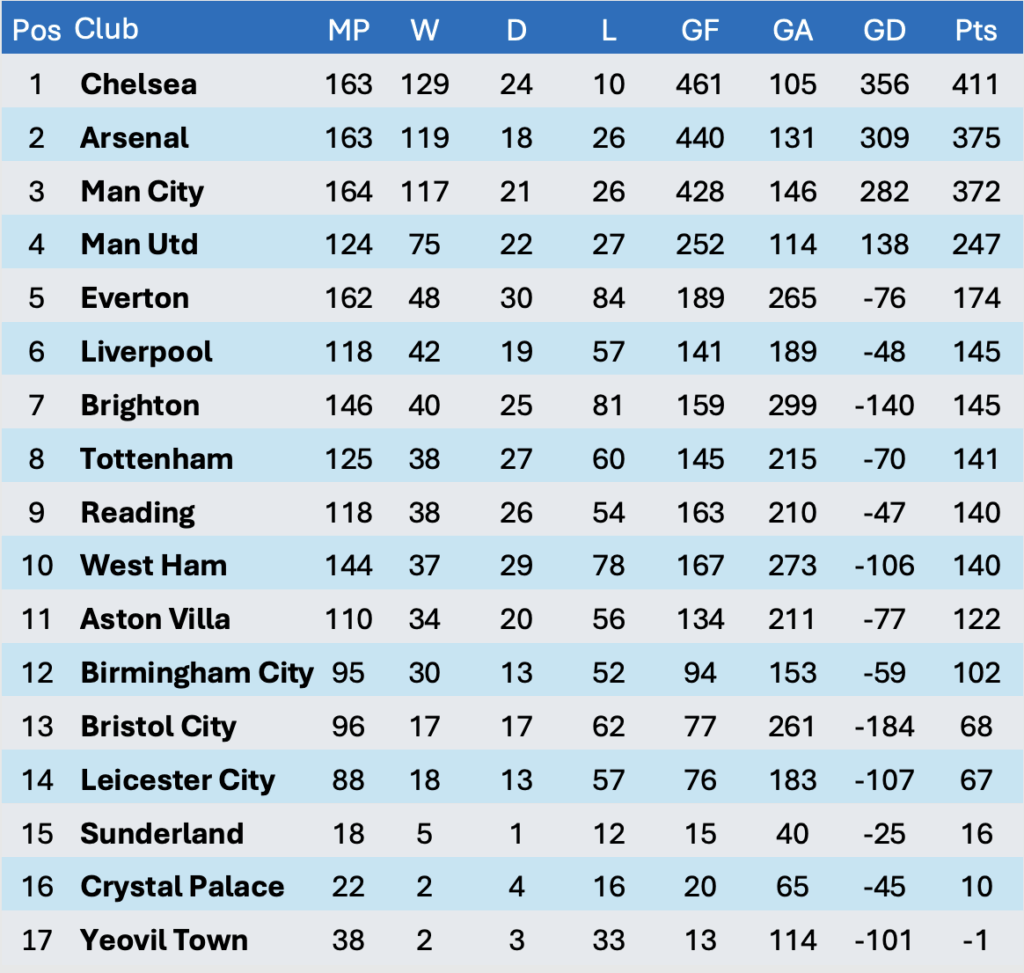
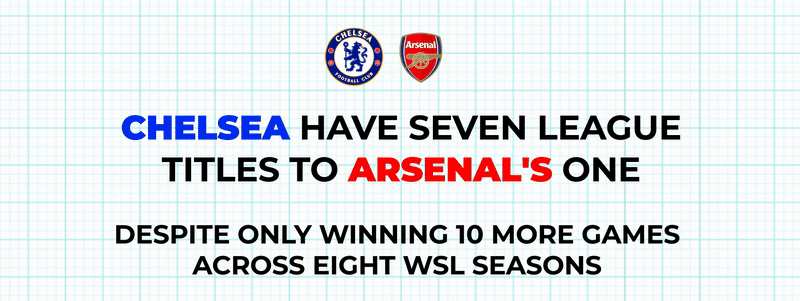
Performance vs Games Played
- Chelsea: 79% win rate, just 6% losses (absurd stat)
- Arsenal & City: Both above 70% win rate
- Liverpool: at 36% the 5th best in the league
- Leicester (20%), West Ham (26%), Brighton (27%) sit lowest.
Surprisingly, relegated Reading (32%) and Birmingham City (32%) outperformed those three – proof survival isn’t just about performance, but timing.
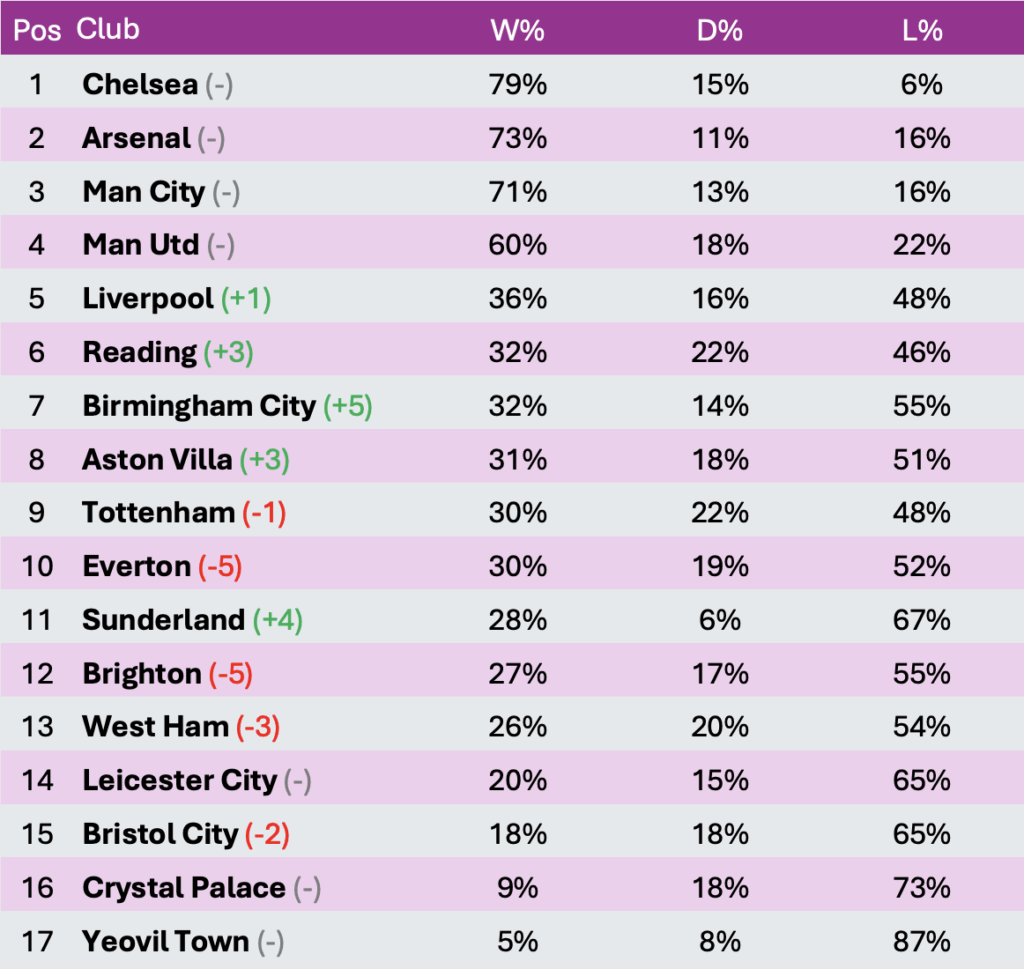
Average Points Per Game (Current Teams)
- Chelsea (2.5 PPG): Untouchable
- Arsenal & City (2.3): Consistently elite
- United (2.0): Strong, still chasing
At the bottom, Leicester (0.76), West Ham (0.97), and Brighton (0.99) average less than a point per game.
If trends hold in 2025–26, they’d finish on:
- Leicester: 16 points
- West Ham: 21 points
- Brighton: 22 points
Enough to stay up in every WSL season so far – but as we know, maths doesn’t win football matches.
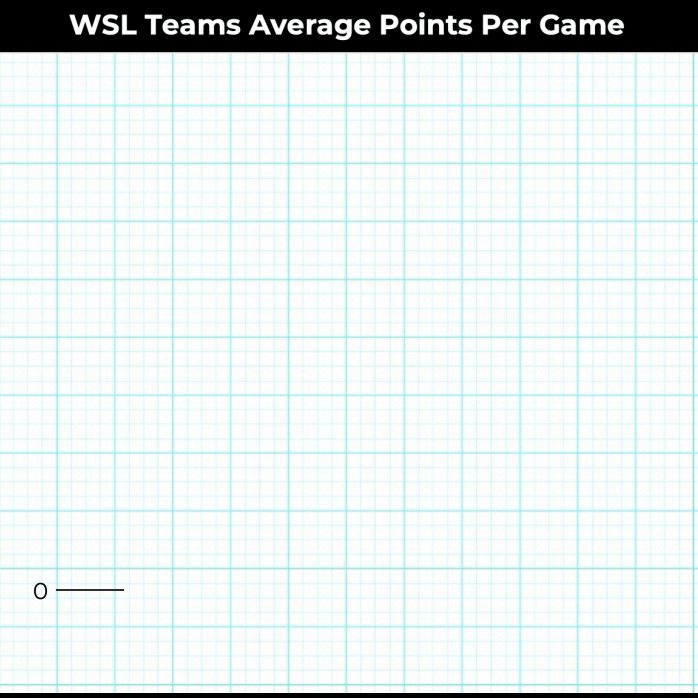
What It Takes to Win
Since the 12-team format began, the magic number has been 57 points – enough to win every title. Drop more than nine points, and it’s squeaky bum time.
Chelsea’s reign has been relentless, but the margins have often been razor-thin:
- 2020–21 to 2022–23: Titles decided by 0–2 points
- 2023–24: Decided on goal difference
- 2024–25: The anomaly, Chelsea stormed it with 60 points, 12 clear
Six straight titles tell the story of dominance. The fine print, though, shows how close others have come. The question is whether 2024–25 was the moment Chelsea finally broke free of the chasing pack and turned the WSL into a one-horse race.
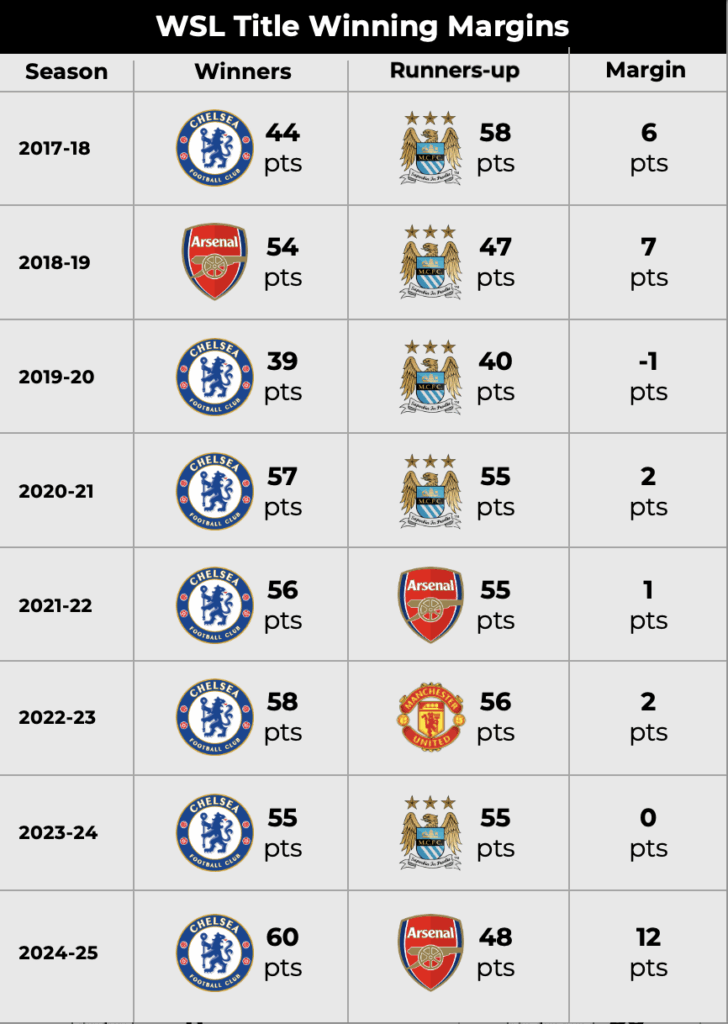

How Many Points Guarantee Safety?
- Average relegated team points: 8
- Last four seasons: 9.5
- Guaranteed survival: 13
Put simply: if you can’t manage 13 points from 66 available, you probably don’t deserve to stay up.
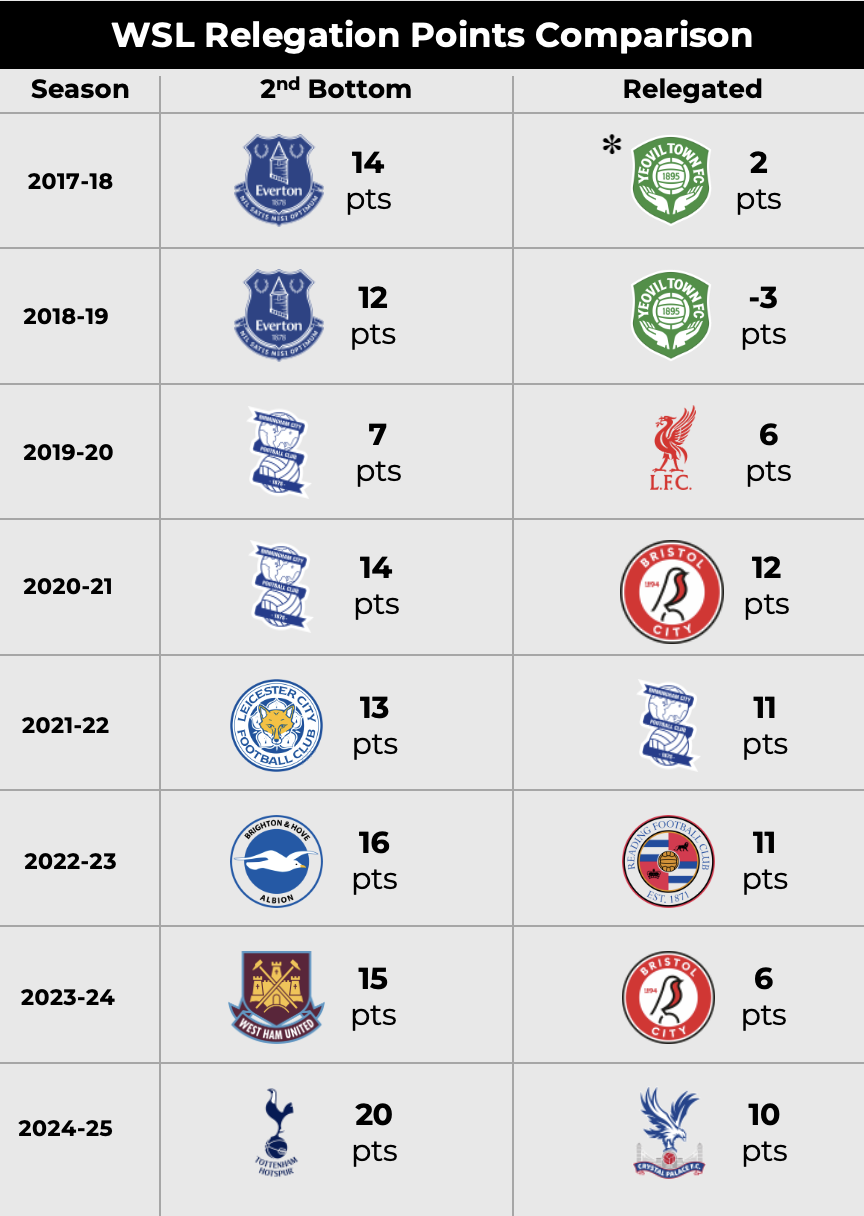

Single-Season Records
- Most Wins: 19 – Chelsea (2024–25)
- Most Goals Scored: 71 – Chelsea (2023–24)
- Fewest Conceded: 10 – Chelsea (2020–21), Arsenal (2021–22)
- Most Conceded: 72 – Bristol City (2020–21)
Chelsea’s unbeaten 2024–25 was just the second in WSL history (after their 2017–18 campaign). At the other extreme, Bristol’s defensive record is a warning to every newcomer.
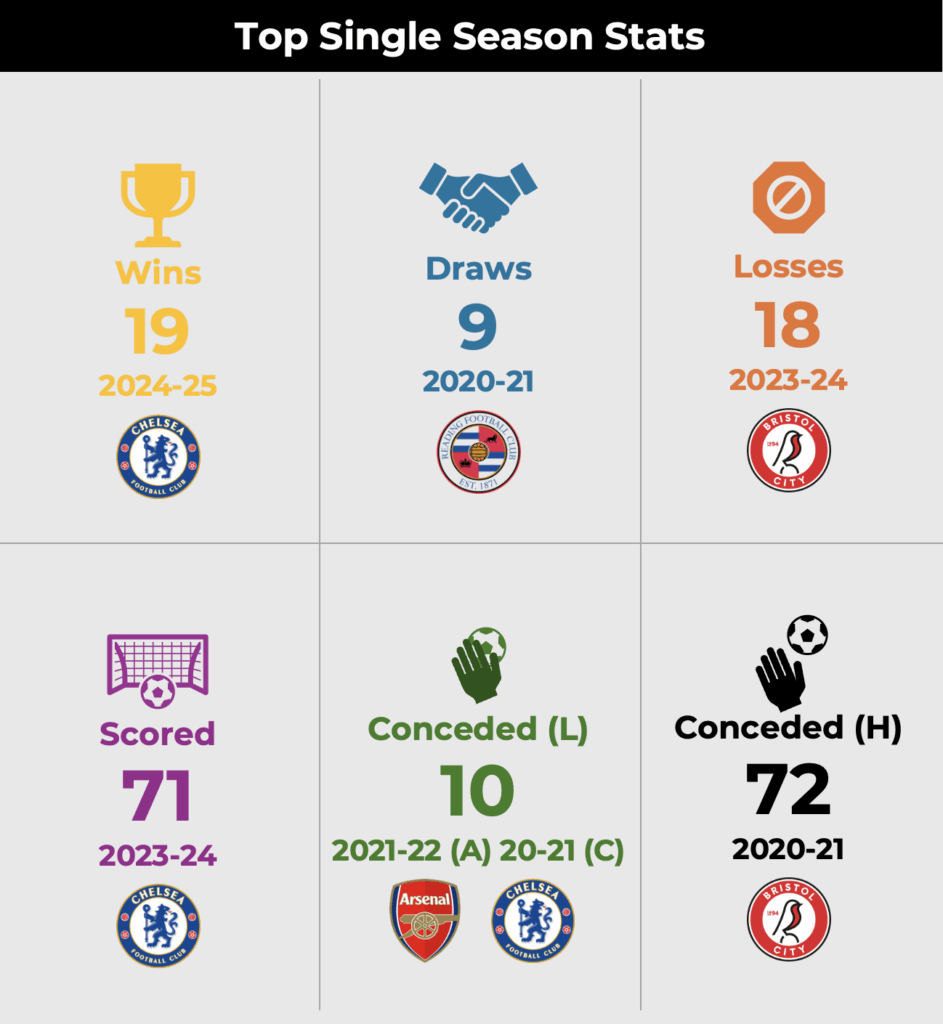
The Biggest Scoreline
The WSL has produced some spectacular mismatches, none bigger than Arsenal’s 11–1 demolition of Bristol City in 2019 – still the highest-scoring game in league history.
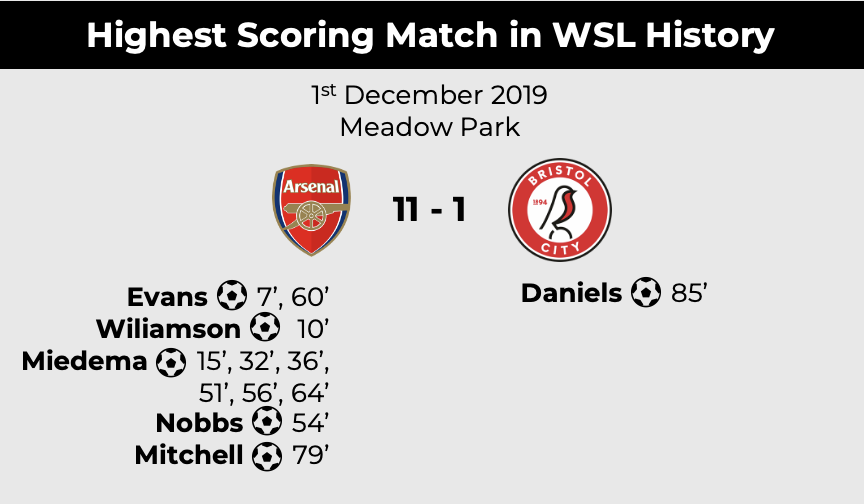
The Bottom Line
With the 2025–26 season just underway, one thing is certain: the WSL will deliver goals and drama.
Chelsea remain favourites, but the gap should be tighter than last season. With relegation now decided by a playoff against WSL2’s third-placed side, survival comes with a second chance. Expect real drama at the bottom this season.
The arrival of a strong London City Lionesses side and an influx of top players promises a more competitive middle of the table. The big questions are whether anyone can finally catch Chelsea – or even break into the established top four.
And with expansion to 14 clubs in 2026–27 and fresh investment flowing in, the race won’t just be for silverware but for survival – and all the long-term rewards that come with it.
For more VERTA long reads, check out our Opinion & Insights section here
If you would like to discuss anything in this piece contact michael@verta.uk







